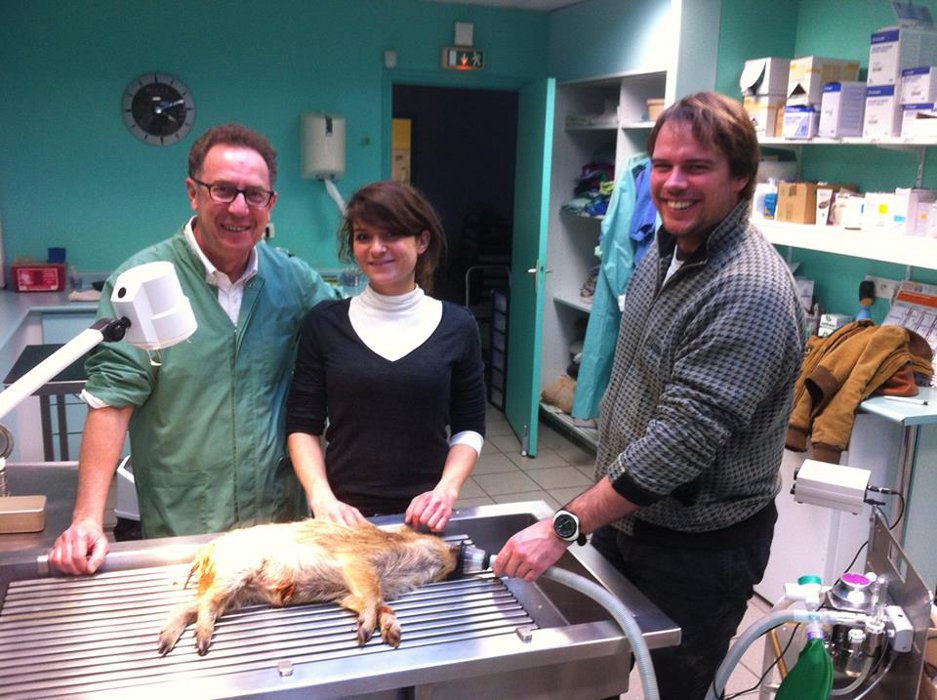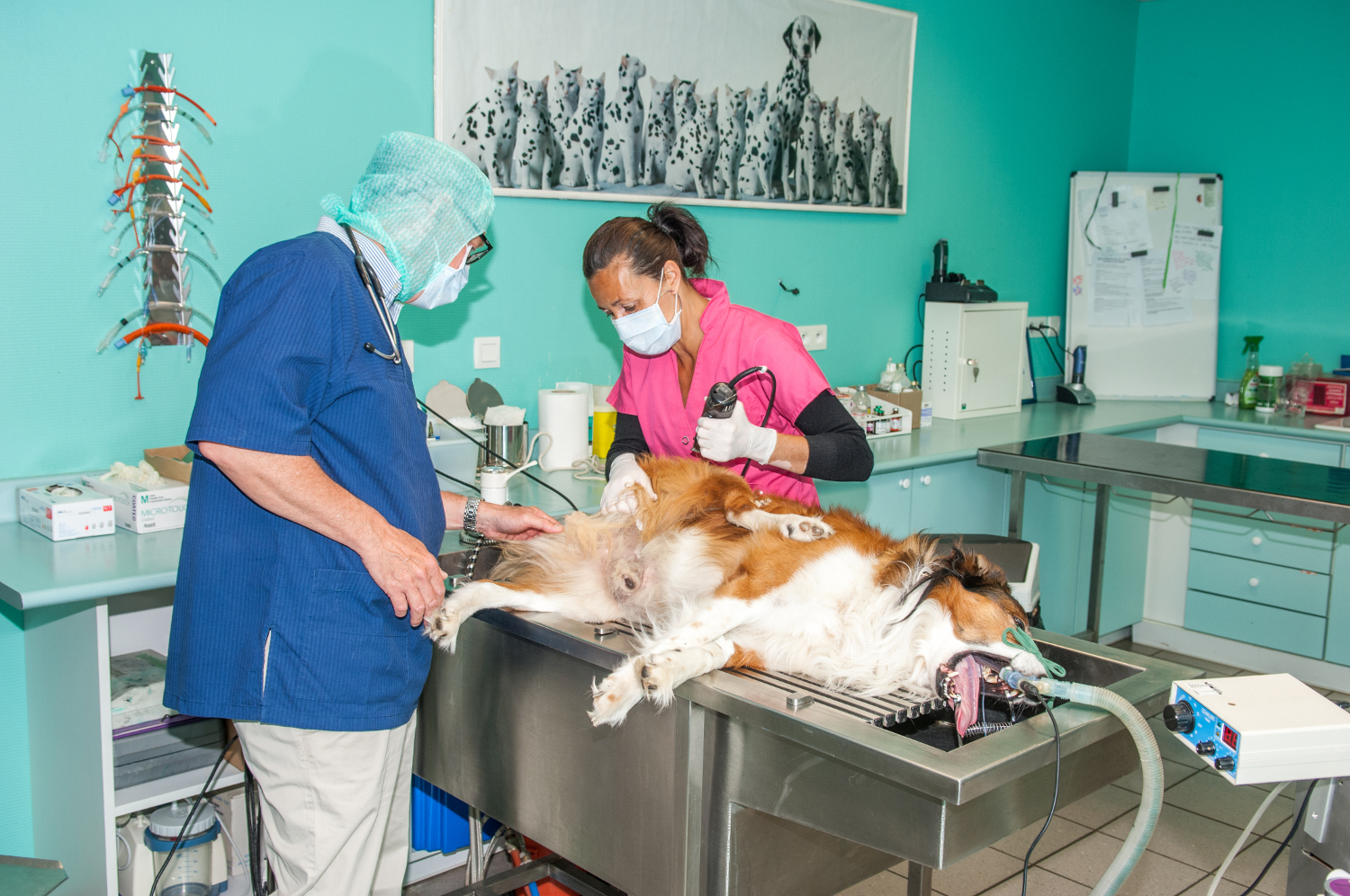Why you should neuter your dog
Many owners are still hesitant to have their dogs spayed or neutered, mainly because of ethical issues. Indeed, one may wonder on what grounds humans have the right to eliminate the reproductive capacity of their four-legged companion and deprive the bitch of the joys of motherhood.
In reality, having your dog spayed or neutered is more of a human duty than a right, and it is important to consider all the benefits of this operation for the health of our dog friends, which go far beyond the simple comfort of the owner. Not only are "whole" dogs more vulnerable to serious diseases, but they can also suffer psychologically from not being able to reproduce when their hormones strongly encourage them to do so.
What is spaying or neutering?
Dog spaying and neutering are both treatments designed to remove the reproductive functions of the animal. Spaying refers specifically to the medical procedure for male dogs, while neutering is for female dogs.
However, it is common to use the term "spaying" to refer to both male and female dogs, especially in an effort to banish the term "castration" which has a somewhat brutal connotation that does not match the reality of the operation. Both castration and sterilization can be performed either surgically, in which case they are definitive, or chemically, in which case they are temporary.
The more widespread surgical operation involves less risk for the health of the dog, contrary to what one might imagine. Indeed, even if surgery is abrasive, it remains a minor and common operation, so that veterinarians have a great mastery of it and carry it out almost without any complication.
Chemical methods, on the other hand, involve giving medicated substances to dogs over a long period of time, which undoubtedly causes disturbances in their organism and highly favors the development of cancer. Surgical sterilization of the bitch consists of the removal of the ovaries, this is called ovariectomy or, more rarely, ovariohysterectomy when the uterus is also removed.
Surgical castration in male dogs consists of the removal of the animal's testicles, this is called an orchiectomy. In both males and females, the production of sex hormones is interrupted by the removal of the ovaries or testicles that produce them.

Why should I have my dog spayed or neutered?
The benefits of spaying and neutering a dog are numerous, both in terms of health and behavior. It is, moreover, the only way to fight against dog overpopulation, as accidental litters are, by nature, quite unpredictable, despite the efforts of the owners to prevent their animals from running away.
Health benefits of neutering a dog
Both the neutered male dog and the neutered female dog have a higher life expectancy than their whole counterparts. The castration of the male dog allows both to prevent the appearance of certain diseases, but also to treat existing pathologies. The diseases targeted by this operation are the so-called "hormone-dependent" ones that occur due to disorders related to sex hormones, a common problem in both dogs and humans.
Testicular tumors, which are common in dogs, are a major health risk for the animal that disappears with the removal of the testicles, i.e. surgical sterilization. Spaying is also effective in preventing perianal tumors, perineal hernias and anal sac abscesses, although the risk is not 100% eliminated. Prostate hyperplasia is also a common condition in dogs that carries a high risk of abscess and inflammation.
Approximately 50 to 80% of dogs over 5 years of age and 95% of those over 9 years of age develop this pathology which is due to hormonal disturbances, and more particularly to disorders in the production of testosterone. Castration is the only effective means of prevention to fight against the appearance of these disorders and drastically reduce the risks of complications. In case of sudden pathology such as torsion, inflammation or testicular tumor, as well as prostate disorders, castration is usually an unavoidable solution to cure the dog and offer a good prognosis.
Hormonal disorders such as Feminization Syndrome, involving the appearance of testicular tumors, hair loss in the perianal and perineal area and abnormal development of the udder, are also treated by castration which rebalances the dog's hormonal levels. Finally, in puppies suffering from cryptorchidism, an abnormal development of the testicles that do not descend properly and migrate towards the abdomen, castration allows to avoid complications, especially cancerous ones, that frequently occur. Spaying the bitch significantly reduces the risk of ovarian tumors, mammary tumors, uterine infections, and nervous pregnancies.
Mammary tumors are particularly common in the bitch and are a significant cause of mortality. Like testicular tumors in the male dog, mammary tumors are hormone-dependent, meaning that the production of sex hormones is involved in their development. Ovarian disorders (tumors and cysts) are completely eliminated by surgical sterilization, which consists of the removal of these organs.
Uterine disorders (pyometra, metritis, etc.) are also common and affect about 1 in 3 non-spayed bitches. These infections are particularly dangerous, sometimes silent, and can cause necrosis of the affected organs, but also of those surrounding the reproductive system. The preferred treatment for a bitch that is not intended for breeding is surgical sterilization by ovariohysterectomy, i.e. removal of the ovaries and uterus.
Preventive sterilization greatly reduces the risk of pathologies of the uterus even when it is preserved, because it is no longer subject to hormonal fluctuations that can jeopardize it.
Benefits of spaying and neutering dogs on their behavior
Sterilization of male and female dogs significantly reduces the impact of their sex hormones on their behavior. Behaviors related to these hormones, called reproductive behaviors, are often a source of worry for the owner and danger for the dog. Males, who are constantly in heat, are more concerned than females, who are only in heat twice a year, except in the case of certain pathologies that cause constant heat.
The unneutered male dog reacts more impulsively to his environment and to certain requests from humans as well as from his peers, with a higher degree of aggressiveness than the neutered dog. He will often be aggressive towards his peers (which should be distinguished from problems related to poor socialization), as he will be eager to eliminate the competition in order to be the only suitor in the neighborhood in case a female comes along. Both males and females are likely to run away to find a mate, although male dogs are more likely to do so.
Male dogs will also tend to urinate all over the place to mark their territory, which often leads to uncontrollable cleanliness problems. Spaying usually eliminates all problems related to a dog's reproductive behavior, provided that the operation is performed early enough, before the animal develops bad habits. However, it should not be considered a miracle operation, as this procedure does not change the dog's character (a stubborn animal will remain stubborn, for example) nor the behaviors related to a malaise caused by the animal's lifestyle, physical suffering or psychological imbalance.
Benefits of spaying and neutering dogs on dog overpopulation
Not surprisingly, spaying and neutering are essential to fight the scourge of animal abandonment and abuse that is still rampant. Indeed, records are kept of animal abandonment, and shelters are full to bursting with dogs waiting for a second chance. Breeding your dog, involuntarily or not, amplifies the problem, even if you manage to give all your puppies away.
These puppies will not only take the place of abandoned puppies waiting for a home, but may also become unsterilized adults who will give birth to other puppies that may be directly abandoned or killed at birth. In fact, even if you don't feel responsible for abandonment and animal abuse, you have to admit that by keeping your dog "whole" you run the risk - even if minimal - of causing a gestation.
This one can then give birth to puppies that will also reproduce afterwards, giving birth to new puppies, which feeds permanently the phenomenon of dog overpopulation that is difficult to control. Spaying or neutering is not only an act you do for your dog's health and your comfort, but also for all the dogs and puppies in shelters that suffer from the competition of constant litters of their peers.

Spaying and neutering of dogs: the received ideas
If spaying and neutering of dogs is so popular with veterinarians, it is because it brings many benefits to our pets, both physically and psychologically. Unfortunately, it is this last point that makes many owners skeptical, imagining that their pets will be unhappy without their reproductive abilities. Preconceived ideas that make life difficult for our dogs, castration and sterilization of dogs are still very little practiced.
Spaying or neutering your dog is not ethical
The ethical issue of spaying and neutering a dog revolves around the idea that it would be wrong for humans to decide to suppress the reproductive functions of their dog. Some owners assume that a spayed or neutered animal will feel diminished, unhappy, and will not even have a real purpose in life... These concerns are unfounded and are most often the result of anthropomorphism, that is, a projection of human feelings onto an animal.
Anthropomorphism is a term that makes many owners jump, convinced that dogs feel the same way as we do and should be considered our equals. However, in order to understand your pet, you have to accept that it is not a human and does not function in the same way as we do. This simple fact is not an argument in favor of animal neglect or abuse, quite the contrary.
It has long been proven that dogs are sentient beings, and the purpose of this article is not to neglect the feelings of our companions, their needs and the need to respect them. Considering a dog as what it is, an animal with a perception of the world different from ours, is on the contrary the best way to learn to understand and take care of it. In this spirit, it is necessary to detach ourselves from our human vision of motherhood and fatherhood: a dog does not reproduce for the joy of being a parent, but by survival instinct that pushes him to perpetuate his race.
This does not prevent dogs from loving their puppies and often taking great care of them, but this should not be confused with a desire to have children. It is actually a behavior that allows puppies to learn to socialize through the games and cuddles that their parents offer them so that they are able to survive in a group when they are adults. Also, reproduction in dogs is an instinct and not a "conscious will" to have puppies and raise them.
Furthermore, the majority of owners who do not have their dogs neutered or operated on do not let them reproduce. The animals are then condemned to suffer the action of their hormones on their mind and body without being able to calm this internal boiling by a mating. Bitches go into heat twice a year, sometimes writhing and whimpering in pain, but this does not allow them to reproduce.
Male dogs go crazy when they smell a bitch in heat and will do anything to try to get to her by running away or pulling on their leash, sometimes causing serious injury. Furthermore, allowing your dog to reproduce means giving birth to new puppies which, if they find masters to adopt them, will potentially take the place of a doggie abandoned in a shelter and desperately waiting for a new family. In fact, tens of thousands of dogs are taken in by animal shelters every year, and the number one cause of abandonment is, I'll give you that, unwanted litters.
Participating - involuntarily - to the heavy problem of dog overpopulation is certainly not more ethical than having your dog sterilized. Finally, it is very illogical to argue against sterilization by underlining that reproduction is natural for the animal, then your dog walks on a leash, lives in a closed place, eats industrial food, learns to obey orders... So many elements which have nothing natural.
Spaying or neutering your dog makes him unhappy
As we mentioned earlier in the section on the ethical aspect of spaying or neutering, a dog is most unhappy when it cannot reproduce despite the stimulation of its hormones. Sexual frustration in dogs does exist, and it is naturally caused by the animal's hormones to push it to reproduce and perpetuate its breed. A male dog titillated by the scent of a female dog can suffer enormously from not being able to join her, both psychologically and physically.
Indeed, the animal is capable of injuring itself by running away, and the doggies who are hit by a car or get lost and end up in a shelter while they were trying to join their sweetheart are unfortunately legion. Locked up at home, the dog can be irascible, more unpredictable, and less attentive if he is obsessed by a smell that he can smell from several kilometers away. As for the bitch, she can also adopt an unstable behavior during her heat and suffer physically from not being able to reproduce.
This situation results in nervous pregnancies, a widespread disorder that affects about 90% of unspayed bitches at least twice in their lives. A spayed or neutered dog will certainly not be more unhappy than a whole dog, especially if it does not have the opportunity to reproduce. On the contrary, they have the opportunity to live their lives serenely without their sex hormones disturbing their well-being or affecting their health.
Having your dog spayed or neutered makes it obese
It is impossible to deny that spayed or neutered dogs are more prone to being overweight than others, because the suppression of their hormones reduces their daily calorie needs by about 20%. On the other hand, it would be wrong to believe that obesity occurs in all dogs, and even more wrong to believe that it is inevitable. Individuals in good shape before their operation and who have good eating habits will not gain weight if their owner takes care to adjust their ration according to the veterinarian's recommendations.
However, it is necessary to monitor your dog's weight gain to prevent the risk of obesity, which is easier than making a dog lose weight. To do this, regularly run your hands over your dog's ribs: they should be easy to feel, and if you feel them less and less, you should reduce your dog's ration or switch to lighter foods. A very effective practice to avoid weight gain in a spayed or neutered dog is to increase his daily physical activity a little, so that his calorie needs remain the same as before the operation.
Having your dog spayed or neutered makes him stupid or amorphous
This is a common misconception that has a long life! Once and for all, having your dog neutered or spayed does not affect his mental development or his character. It is important to distinguish between a dog's character and its behavior. Aggressiveness, for example, is a behavior that can be reduced by castration of the male dog when it is linked to a dominant instinct or a reproductive behavior.
A dog's intelligence, vitality, energy, stubbornness or grumpiness are all qualities that belong to the animal's character and that will not be modified by sterilization. Furthermore, it is important to note that spaying and neutering only influence the dog's reproductive behavior. A dog that is aggressive because it is afraid of something (fireworks, car trip, etc.) will not be any less aggressive after the operation.
A dog that destroys its owner's property because of loneliness, sedentary life or lack of attention, will not stop its carnage once operated. Dogs that can't stand their peers will stay the same after surgery, unless their aggression towards their peers is related to their hormones and not to a lack of socialization. So don't worry that spaying or neutering will turn your four-legged friend into a lobotomized robot, and conversely, don't count on this operation to solve all your dog's behavioral problems.
Beyond the health issue, it may be necessary to have your dog spayed or neutered to remain in compliance with the law. This operation is mandatory for dogs categorized as potentially dangerous. There are many reasons to have your dog spayed or neutered, and for owners who are still hesitant, discussing this option with your veterinarian can be a good way to make an informed decision, with the well-being of your dog as a priority.

